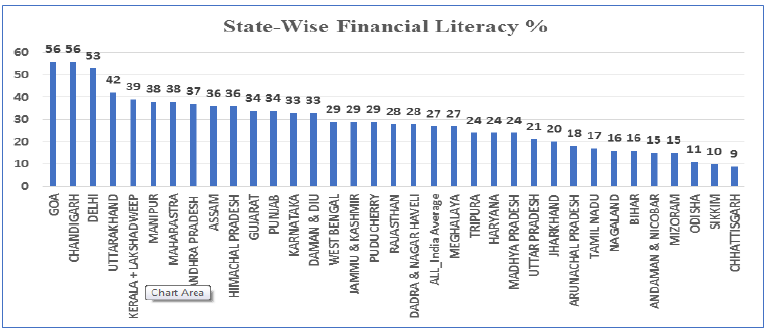An Overview of Financial Education Initiatives in India – A Descriptive Study
DOI:
https://doi.org/10.5281/zenodo.10701649Keywords:
financial literacy, regulatory bodies, strategies for financial educationAbstract
The genesis and significance of financial literacy have come into the limelight since the worldwide economic collapse. Financial literacy is expected controlling device for the unrestricted poverty and economic disparity in India. The Government and financial sector regulators have envisaged “National Strategy for Financial Education” (2020-25) through a very new “5-C” approach “Content”, “Capacity”, “Community”,” Communication” and “Collaboration” to uplift the existing reduced financial literacy rate. This paper elucidates on different initiatives grabbed by the supervisory agencies of India to excel the “financial literacy” among the individuals in the country and alongside compares financial literacy rates state wise in India and with fastest growing countries in Asia. This paper is purely based on various documents published by the regulatory bodies and reviews of research articles. The significance of this paper is advocated as policy makers and research scholars may see it as a value addition to the present literature of financial literacy.
Downloads
References
NSFE (2020-25). National strategy for financial education: A Multi-stakeholder led approach for creating a financially aware and empowered India.
OECD. (2012). High-level principles on national strategy for financial education.
OECD. (2005). Recommendation of principles and good practices for financial education and awareness. Paris: OECD.
Lone, U. M., & Bhat, S. A. (2022). Impact of financial literacy on financial well-being: a mediational role of financial self-efficacy. Journal of Financial Services Marketing, 1–16. Advance online publication. https://doi.org/10.1057/s41264-022-00183-8.
Gibson, P., Sam, J. K., & Cheng, Y. (2021). The value of financial education during multiple life stages. Journal of Financial Counseling and Planning. http://doi.org/10.1891/JFCP-20-00017.
Biswas, S., & Gupta, A. (2021). Impact of financial literacy on household decision-making: A study in the state of west Bengal in India. International Journal of Economics and Financial Issues, 11(5), 104. https://doi.org/10.32479/ijefi.11759.
Kumari, P. (2020). Financial literacy and government initiatives to promote financial literacy in India. International Journal for Innovative Research in Multidisciplinary Field, 10(6).
Agarwal, P. (2020). Financial literacy among working women in different sectors a study of bundelkhand region of Uttar Pradesh. Ph.D. Thesis. Retrieved from: Shodhganga database. http://hdl.handle.net/10603/311411.
Calderone, M., Fiala, N., Mulaj, F., Sadhu, S., & Sarr, L. (2018). Financial education and savings behavior: Evidence from a randomized experiment among low-income clients of branchless banking in India. Economic Development and Cultural Change, 66(4), 793-825.
Jayaraman, J. D., & Jambunathan, S. (2018). Financial literacy among high school students: Evidence from India. Citizenship, Social and Economics Education, 17(3), 168-187. https://doi.org/10.1177/2047173418809712.
Bhutoria, A., & Vignoles, A. (2018). Do financial education interventions for women from poor households impact their financial behaviors? Experimental evidence from India. Journal of Research on Educational Effectiveness, 11(3), 409-432. https://doi.org/10.17863/CAM.2527.
Sayinzoga, A., Bulte, E. H., & Lensink, R. (2016). Financial literacy and financial behaviour: Experimental evidence from rural Rwanda. The Economic Journal, 126(594), 1571-1599. http://www.jstor.org/stable/44076866.
Henager, R., & Cude, B. J. (2016). Financial literacy and long-and short-term financial behavior in different age groups. Journal of Financial Counseling and Planning, 27(1), 3-19.
Klapper, L., Lusardi, A., & Oudheusden, V. P. (2014). Financial literacy around the world: Insights from the S&P Global Finlit Survey.
Executive Summary: NCFE Financial Literacy and Inclusion Survey 2019.

Downloads
Published
How to Cite
Issue
Section
License
Copyright (c) 2024 Dipankar Mondal

This work is licensed under a Creative Commons Attribution 4.0 International License.
Research Articles in 'Management Journal for Advanced Research' are Open Access articles published under the Creative Commons CC BY License Creative Commons Attribution 4.0 International License http://creativecommons.org/licenses/by/4.0/. This license allows you to share – copy and redistribute the material in any medium or format. Adapt – remix, transform, and build upon the material for any purpose, even commercially.









